 Your new post is loading...
 Your new post is loading...

|
Scooped by
Gust MEES
|
Das Tracking wird über die US-Firma Laserlike abgewickelt. Damit die Empfehlungen in der Seitenleiste auch passen, ist der umfangreiche Zugriff auf Daten, etwa den Browser-Verlauf und die aktuell geöffneten Seiten, nötig. Außerdem sammelt Laserlike IP-Adresse, Zugriffszeiten und Verweildauer auf Webseiten.
Im Rahmen von Test-Pilot tracken Laserlike und Mozilla noch Daten zur Nutzung von Advance, etwa Verweildauer auf empfohlenen Seiten oder Informationen zum Betriebssystem. Was man Mozilla zugute halten muss: Sie verschweigen das Thema Tracking nicht und bauen einen Schalter ein, um Advance pausieren zu lassen.
Auch im Privatmodus oder mit eingeschaltetem Tracking-Schutz funktioniert die Erweiterung nicht. Wer möchte, kann die übermittelten Daten einsehen und löschen. Learn more / En savoir plus / Mehr erfahren: https://www.scoop.it/t/securite-pc-et-internet/?&tag=tracking

|
Scooped by
Gust MEES
|
A company that collects the real-time location data on millions of cell phone customers across North America had a bug in its website that allowed anyone to see where a person is located -- without obtaining their consent.
US cell carriers are selling access to your real-time phone location data
The company embroiled in a privacy row has "direct connections" to all major US wireless carriers, including AT&T, Verizon, T-Mobile, and Sprint -- and Canadian cell networks, too.
Earlier this week, we reported that four of the largest cell giants in the US are selling your real-time location data to a company that you've probably never heard about before.
The company, LocationSmart, is a data aggregator and claims to have "direct connections" to cell carriers to obtain locations from nearby cell towers. The site had its own "try-before-you-buy" page that lets you test the accuracy of its data. The page required explicit consent from the user before their location data can be used by sending a one-time text message to the user. When we tried with a colleague, we tracked his phone to a city block of his actual location.
But that website had a bug that allowed anyone to track someone's location silently without their permission.
"Due to a very elementary bug in the website, you can just skip that consent part and go straight to the location," said Robert Xiao, a PhD student at the Human-Computer Interaction Institute at Carnegie Mellon University, in a phone call.
"The implication of this is that LocationSmart never required consent in the first place," he said. "There seems to be no security oversight here."
The "try" website was pulled offline after Xiao privately disclosed the bug to the company, with help from CERT, a public vulnerability database, also at Carnegie Mellon.
Xiao said the bug may have exposed nearly every cell phone customer in the US and Canada, some 200 million customers. Learn more / En savoir plus / Mehr erfahren: https://gustmees.wordpress.com/2013/12/21/privacy-in-the-digital-world-shouldnt-we-talk-about-it/ https://www.scoop.it/t/securite-pc-et-internet/?&tag=tracking https://www.scoop.it/t/securite-pc-et-internet/?&tag=Privacy https://www.scoop.it/t/securite-pc-et-internet/?&tag=Big+Data

|
Scooped by
Gust MEES
|
Spätestens seit dem Cambridge-Analytica-Skandal stehen viele Menschen Facebook skeptisch gegenüber. Wie Forscher nun herausgefunden haben können beim "Login mit Facebook" Skripte von Drittfirmen die Facebook-Identität des Besuchers nachverfolgen.
Wenn ein Internet-Nutzer auf einer Webseite die Funktion "Login mit Facebook" verwendet, gibt er der Webseite, auf der er sich befindet, unter Umständen Zugriff auf sein öffentliches Facebook-Konto. Forscher der Princeton-Universität in den USA warnen nun davor, dass auf dieser Webseite eingebettete Skripte von Dritten ebenfalls Zugriff auf diese Daten haben. Laut den Forschern sammeln Tracker so die Informationen der Webseitenbesucher – in den meisten Fällen wohl ohne dass die betroffene Webseite davon Kenntnis hat. Derartige Scripte fanden sie auf 434 der eine Million meistbesuchten Seiten im Netz.
Die meisten der Dritt-Skripte fragen den Facebook-Namen und die E-Mail-Adresse des Besuchers ab, der sich über Facebook auf der Seite anmeldet. Zwar ist die ID, welche die Skripte abgreifen, erst einmal auf die Anmelde-Routine der besuchten Webseite beschränkt; wie die Forscher zeigen, lassen sich darüber allerdings die öffentlichen Facebook-Informationen des Besuchers extrahieren. Dazu gehört dessen Facebook-Name und sein Profilbild. Learn more / En savoir plus / Mehr erfahren: https://www.scoop.it/t/securite-pc-et-internet/?&tag=Facebook https://gustmees.wordpress.com/2013/12/21/privacy-in-the-digital-world-shouldnt-we-talk-about-it/

|
Scooped by
Gust MEES
|
A little-known data firm was able to build 48 million personal profiles, combining data from sites and social networks like Facebook, LinkedIn, Twitter, and Zillow, among others -- without the users' knowledge or consent.
Localblox, a Bellevue, Wash.-based firm, says it "automatically crawls, discovers, extracts, indexes, maps and augments data in a variety of formats from the web and from exchange networks." Since its founding in 2010, the company has focused its collection on publicly accessible data sources, like social networks Facebook, Twitter, and LinkedIn, and real estate site Zillow to name a few, to produce profiles.
But earlier this year, the company left a massive store of profile data on a public but unlisted Amazon S3 storage bucket without a password, allowing anyone to download its contents.
The bucket, labeled "lbdumps," contained a file that unpacked to a single file over 1.2 terabytes in size. The file listed 48 million individual records, scraped from public profiles, consolidated, then stitched together. Learn more / En savoir plus / Mehr erfahren: https://gustmees.wordpress.com/2013/12/21/privacy-in-the-digital-world-shouldnt-we-talk-about-it/

|
Scooped by
Gust MEES
|
Das Sicherheitsunternehmen Digital Shadows findet auf ungeschützten Servern Milliarden an Datensätzen, auch S3 ist betroffen.
Das Bundesamt für Sicherheit in der Informationstechnik weist auf eine interessante Studie der Sicherheitsforscher von Digital Shadows hin: Viel Medienaufmerksamkeit erhielten zwar in den letzten Jahren Hacker, die in fremde Netze einbrechen, sehr oft sind aber persönliche Daten völlig frei zugänglich und liegen ungeschützt auf diversen Servern. Grund dafür sind wohl oft fehlendes Fachwissen und vielleicht auch Mängel bei den Voreinstellungen von NAS-Speichergeräten.
Die Forscher haben in den letzten drei Monaten mit einem selbst entwickelten Scan-Tool nach per Web zugänglichen Freigaben gesucht: SMB-Freigaben, rsync-Freigabe, FTP-, Amazon S3- oder auch ungeschützten Webseiten und NAS-Servern. Dabei spürten sie insgesamt 1,5 Milliarden an Daten mit einer Dateigröße von 12 TB auf, auf die man problemlos per Web zugreifen kann. Bei einer Analyse der Daten fanden sich darunter unter anderem Steuer-Unterlagen, Patientenlisten und Medizin-Daten. Über eine einzige SMB-Freigabe konnten die Forscher in einem Fall auf über zwei Millionen an Körperscans zugreifen, vielleicht Daten eines italienischen Krankenhauses. Am stärksten betroffen war die USA mit 16,3 Prozent der frei zugänglichen Dateien, Deutschland immerhin mit knapp 8 Prozent. Learn more / En savoir plus / Mehr erfahren: https://www.scoop.it/t/securite-pc-et-internet/?&tag=Privacy

|
Scooped by
Gust MEES
|
Google has removed 89 malicious extensions from the Chrome Web Store that have been installed on over 420,000 browsers, turning them into Monero-mining slaves and loading a tool to record and replay what their owners do on every website they visit.
Researchers at Trend Micro dubbed the family of malicious extensions Droidclub and discovered they included a software library with so-called "session-replay scripts" used by online analytics firms.
Princeton's Center for Information Technology in November drew attention to the increasing use of session-replay scripts by third-party analytics firms on high-traffic websites.
The study looked at replay services from Yandex, FullStory, Hotjar, UserReplay, Smartlook, Clicktale, and SessionCam, which were found on nearly 500 popular sites.
The scripts allow a site owner to essentially shoulder-surf their visitors by recording and replaying your "keystrokes, mouse movements, and scrolling behavior, along with the entire contents of the pages you visit".
But instead of allowing a site owner to record and play back what users do on one site, Droidclub extensions allow the attacker to see what victims do on every single site they visit. Learn more / En savoir plus / Mehr erfahren: https://www.scoop.it/t/securite-pc-et-internet/?&tag=Cyberespionage https://www.scoop.it/t/securite-pc-et-internet/?&tag=Privacy https://gustmees.wordpress.com/2013/12/21/privacy-in-the-digital-world-shouldnt-we-talk-about-it/ https://www.scoop.it/t/securite-pc-et-internet/?&tag=Session-Replay+Scripts

|
Scooped by
Gust MEES
|
A flaw in Hotspot Shield can expose VPN users, locations
The virtual private network says it provides a way to browse the web "anonymously and privately," but a security researcher has released code that could identify users' names and locations.
A security researcher has found a way to identify users of Hotspot Shield, a popular free virtual private network service that promises its users anonymity and privacy.
Hotspot Shield, developed by AnchorFree, has an estimated 500 million users around the world relying on its privacy service. By bouncing a user's internet and browsing traffic through its own encrypted pipes, the service makes it harder for others to identify individual users and eavesdrop on their browsing habits.
But an information disclosure bug in the privacy service results in a leak of user data, such as which country the user is located, and the user's Wi-Fi network name, if connected.
That information leak can be used to narrow down users and their location by correlating Wi-Fi network name with public and readily available data.
"By disclosing information such as Wi-Fi name, an attacker can easily narrow down or pinpoint where the victim is located," said Paulos Yibelo, who found the bug. Combined with knowing the user's country, "you can narrow down a list of places where your victim is located," he said.
ZDNet was able to independently verify Yibelo's findings by using his proof-of-concept code to reveal a user's Wi-Fi network. We tested on several machines and different networks, all with the same result.
VPNs are popular for activists or dissidents in parts of the world where internet access is restricted because of censorship, or heavily monitored by the state, as these services mask a user's IP addresses that can be used to pinpoint a person's real-world location.
Being able to identify a Hotspot Shield user in an authoritarian state could put them at risk!!! Learn more / En savoir plus / Mehr erfahren: https://www.scoop.it/t/securite-pc-et-internet/?&tag=VPN

|
Scooped by
Gust MEES
|
Grammarly has fixed a security bug in its Chrome extension that inadvertently allowed access to a user's account -- including their private documents and data.
Tavis Ormandy, a security researcher at Google's Project Zero who found the "high severity" vulnerability, said the browser extension exposed authentication tokens to all websites.
That means any website can access a user's documents, history, logs, and other data, the bug report said.
"I'm calling this a high severity bug, because it seems like a pretty severe violation of user expectations," said Ormandy, because "users would not expect that visiting a website gives it permission to access documents or data they've typed into other websites."
In proof-of-concept code, he explained how to trigger the bug in four lines of code.
More than 22 million users have installed the grammar-checking extension.
Ormandy filed his bug report Friday, subject to a 90-day disclosure deadline -- as is the industry standard. Grammarly issued an automatic update Monday to fix the issue.
Ormandy has in recent months examined several vulnerable web browser extensions. Earlier this year, he found a remote code execution flaw in the Cisco WebEx Chrome extension, and a data-stealing bug in the popular LastPass password manager.
A spokesperson for Grammarly did not immediately return a request for comment.
Learn more / En savoir plus / Mehr erfahren: https://www.scoop.it/t/securite-pc-et-internet/?&tag=DATA-BREACHES

|
Scooped by
Gust MEES
|
Ein internationales Forscherteam hat die Leistungsfähigkeit von Datenschutz-Tools für Internet-Browser untersucht. Während viele Anti-Tracking-Erweiterung einen deutlichen Mehrwert liefern, entpuppen sich andere als Schlangenöl. Learn more / En savoir plus / Mehr erfahren: https://www.scoop.it/t/securite-pc-et-internet/?&tag=Privacy

|
Scooped by
Gust MEES
|
Insbesondere durch Social Engineering sammeln Cyberkriminelle Informationen, mit deren Hilfe sie Unternehmen ausspähen können, Schadsoftware platzieren oder gleich direkt wie zum Beispiel bei Ransomware Attacken oder durch fälschlicherweise initiierte Geldüberweisungen Unternehmen massiv schädigen. Wir stellen in unseren Analysen immer mehr fest, dass für diverse Angriffsszenarien auch Trackinginformationen herangezogen werden.
Unter folgendem Link können Sie Ihren Browser testen, ob er genügend Schutz gegen unerwünschtes Tracking bietet.
https://datenschutz-agentur.de/ist-ihr-browser-sicher-vor-trackingtechnologien/
Sollte hier aufgezeigt werden, dass Sie identifizierbar sind, sollten Sie geeignete Schutzmaßnahmen gegen das Browser-Tracking ergreifen. Learn more / En savoir plus / Mehr erfahren: https://www.scoop.it/t/securite-pc-et-internet/?&tag=tracking

|
Scooped by
Gust MEES
|
Would more Nazis and terrorists on social media make our internet more free?
FCC Chairman Ajit Pai, speaking Tuesday at a panel on the “future of internet freedom,” asked and answered this question in staunchly libertarian terms, calling out YouTube, Facebook and Twitter’s purported double standards against conservatives and identifying them as the “actual threat” to the open internet. Pai’s critics say net neutrality repeal will lay the groundwork for ISPs to fragment and meter out the internet, but, speaking on a panel hosted by libertarian think tank, R Street Institute, Pai said Silicon Valley—wicked, liberal, Silicon Valley—already does this by promoting some viewpoints while suppressing others.
His first target: Twitter. Twitter openly supports net neutrality, which Pai argued is hypocritical because they differentiate between users based on their viewpoints. Learn more / En savoir plus / Mehr erfahren: https://www.scoop.it/t/securite-pc-et-internet/?&tag=net+neutrality

|
Scooped by
Gust MEES
|
Des dizaines de sociétés s’insèrent dans des applications banales pour collecter des données, amassant des informations sur des millions de Français.
Par dizaines, ils se nichent dans des applications mobiles utilisées quotidiennement par des millions de Français. Ils capturent discrètement des données, souvent personnelles, sans que les utilisateurs n’en soient nécessairement conscients, alimentant au passage une industrie opaque et méconnue. Certains de ses acteurs disposent de données sur des millions de Français.
Il s’agit de trackers, de petits logiciels incorporés dans des applications mobiles du quotidien (réseaux sociaux, médias, banques, sites de rencontre). Chaque application en compte 2,5 en moyenne, selon une analyse de plus de 350 applications, réalisée par un groupe d’activistes, rassemblés depuis octobre en association, et publiée vendredi 24 novembre sur leur plate-forme baptisée Exodus. Rares sont les applications qui en sont dépourvues et certaines vont jusqu’à en intégrer une quinzaine. Ce paysage n’est pas exhaustif : la plate-forme ne cherche que les trackers qu’elle a préalablement identifiés, soit une quarantaine. Learn more / En savoir plus / Mehr erfahren: https://www.scoop.it/t/securite-pc-et-internet/?&tag=Cyberespionage https://www.scoop.it/t/securite-pc-et-internet/?&tag=Privacy https://gustmees.wordpress.com/2013/12/21/privacy-in-the-digital-world-shouldnt-we-talk-about-it/ https://www.scoop.it/t/securite-pc-et-internet/?&tag=tracking

|
Scooped by
Gust MEES
|
Am Beispiel der Gesichtserkennung im neuen iPhone X illustriert der Whistleblower Edward Snowden die Gefahren, denen wir uns schon in naher Zukunft stellen müssen.
Im Rahmen einer Keynote auf der JBFOne, dem IT-Kongress der Fiducia & GAD, warnte Edward Snowden davor, dass Firmen immer mehr Daten anhäufen und ganz offensichtlich nicht in der Lage sind, diese zu schützen. Das zeige gerade aktuell das Beispiel des Fahrdienstes Uber, der erst jetzt zugab, dass ihm 2016 Kundendaten geklaut wurden. Auf der anderen Seite geben Endanwender immer mehr Daten über sich preis. Sie nutzen ganz freiwillig Überwachungs-Gerätschaften, wie sie sich selbst Orwell nicht hätte vorstellen können.
Als Beispiel führte der live aus seinem russischen Exil zugeschaltete Whistleblower das neue iPhone X an. Apples neues Smartphone verfügt über eine eingebaute Gesichtserkennung, die unter anderem zur Authentifizierung des Anwenders genutzt wird. Die sei zwar bereits umgangen worden, aber das sei gar nicht das eigentliche Problem. Das liege vielmehr darin, dass Apple auch Entwicklern von Fremd-Apps Zugriff auf die Daten der intelligenten Gesichtserfassung gewähren will. Und diese werden das missbrauchen, malt Snowden den Teufel an die Wand.
Werbung beobachtet den Anwender Learn more / En savoir plus / Mehr erfahren: https://www.scoop.it/t/securite-pc-et-internet/?&tag=Cyberespionage https://www.scoop.it/t/securite-pc-et-internet/?&tag=Privacy https://gustmees.wordpress.com/2013/12/21/privacy-in-the-digital-world-shouldnt-we-talk-about-it/ https://www.scoop.it/t/securite-pc-et-internet/?&tag=tracking
|

|
Scooped by
Gust MEES
|
The latest Facebook privacy SNAFU (Situation Normal, All Facebooked Up) is a bug that changed settings on some accounts, automatically suggesting that their updates be posted publicly, even though users had previously set their updates as “private”.
On Thursday, Facebook asked 14 million users to review posts made between 18 May and 22 May: that’s when the bug was changing account settings. Not all of the 14 million users affected by the bug necessarily had their information publicly, mistakenly shared, but best to check.
Facebook Chief Privacy Officer Erin Egan said in a post that as of Thursday, the company had started letting those 14 million people know about the situation. She stressed that the bug didn’t affect anything people had posted before that time, and even then, they could still have chosen their audience like they always have.
Normally, the audience selector is supposed to be sticky: every time you share something, you get to choose who sees it, and the suggestion is supposed to be based on who you shared stuff with the last time you posted. Friends only? Fine, that’s what should be automatically suggested for the next post, and the one after that, until you change it… or a weird little glitch like this pops up. Learn more / En savoir plus / Mehr erfahren: https://www.scoop.it/t/securite-pc-et-internet/?&tag=Facebook

|
Scooped by
Gust MEES
|
Forscher der Princeton University haben kürzlich ein anspruchsvolles Tool entdeckt, dass den Namen „Session-Replay Script“ trägt. Damit sind Berichte über das User-Verhalten selbst bis ins kleinste Detail möglich. Die eingebetteten Code-Schnipsel beobachten und verfolgen jede Interaktion eines Webseitenbesuchers mit der Webseite in Echtzeit. Es ist so, als ob ihm jemand beim Surfen über die Schulter sieht. Anders ausgedrückt ermöglichen diese „Screen Recordings“ das Aufzeichnen jeder Tastatureingabe, jeder Mausbewegung oder jedes Page Scrollings. Alles wird zusammen mit dem Content der Webseite zu einem Paket geschnürt und an Third-Party Server – also an Dritte – zur Analysierung geschickt.
Wir haben die Session-Replay Scipts von sieben der beliebtesten Anbieter solcher Tools untersucht. Das Ergebnis: 482 der weltweit 50.000 meistbesuchten Webseiten benutzen eines der Scripte. Sicherlich ist das nur ein winziger Teil des Internets, wahrscheinlich liegt die tatsächliche Zahl der im Gebrauch befindlichen Scripts weitaus höher.
Was sind die Risiken von Session-Replay Scripts?
Eigentlich sind die Scripts für legitime Anwendungszwecke gedacht. Dazu gehört beispielsweise das Verstehen, wie die User mit der eigenen Webseite zurechtkommen oder das Aufspüren von unverständlichen Abschnitten. Der Einsatz von Session-Replay-Scripts kann aber profunde Auswirkungen auf die Privatsphäre und die Sicherheit haben. Am wichtigsten ist die Tatsache, dass so ein Script nicht zwischen sensiblen und profanen Daten unterscheidet. Ohne angemessene Sicherheitsmaßnahmen können sensible Nutzerdaten preisgegeben werden, wie Login-Daten, Kreditkartendaten oder Informationen zum Gesundheitszustand. Außerdem tracken die Scripts Informationen, die in Echtzeit in ein Feld eingegeben werden, ohne dass sie schon an den Server übermittelt sind – das Aufzeichnen von eigentlich gelöschten Eingaben ist damit möglich.
Weiterhin beabsichtigen die Scripts das Aufzeichnen und Abrufen von individuellen Browser Sessions. Anonymität kann dadurch nicht gewährleistet werden. Aus dem vorangegangenen Whitepaper geht hervor, dass einige Provider sogar echte Namen einzelnen User-Sessions zuordnen. Learn more / En savoir plus / Mehr erfahren: https://www.scoop.it/t/securite-pc-et-internet/?&tag=Session-Replay+Scripts https://www.scoop.it/t/securite-pc-et-internet/?&tag=tracking

|
Scooped by
Gust MEES
|
Nextcloud is pleased to announce that the German Federal Information Technology Center (ITZBund) has chosen Nextcloud as their solution for efficient and secure file sharing and collaboration in a public tender. Nextcloud is operated by the ITZBund, the central IT service provider of the federal government, and made available to around 300,000 users. ITZBund uses a Nextcloud Enterprise Subscription to gain access to operational, scaling and security expertise of Nextcloud GmbH as well as long-term support of the software.
IT service provider for the federal government
ITZBund is the central IT service provider of the German federal government and operates IT Services for over one million administrative and industrial users. It emerged from the merger of the Federal Agency for Information Technology (Division of the Federal Ministry of the Interior), the Federal Agency for IT Services (Division of the Federal Ministry of Transport and Digital Infrastructure) and the Center for Information Processing and Information Technology (division of the Federal Ministry of Finance). ITZBund employs about 2.700 people, mostly IT specialists, engineers and network and security professionals. Learn more / En savoir plus / Mehr erfahren: https://www.scoop.it/t/securite-pc-et-internet/?&tag=Privacy

|
Scooped by
Gust MEES
|
Millions of apps leak personal identifiable information such as name, age, income and possibly even phone numbers and email addresses. At fault are app developers who do not protect ad-targeting data transmitted to third-party advertisers. “The scale of what we first thought was just specific cases of careless application design is overwhelming,” said Roman Unuchek, security researcher, Kaspersky Lab, who introduced his research here at the RSA Conference on Tuesday. “Millions of applications include third party SDKs, exposing private data that can be easily intercepted and modified – leading to malware infections, blackmail and other highly effective attack vectors on your devices.” Data sent unencrypted over HTTP can be collected by cybercriminals that share the same Wi-Fi network, or by an ISP or even by malware installed on a target’s home router, researchers said. Not only can unprotected data be collected, but it can also be intercepted by a cybercriminal who can modify it to show malicious ads, enticing users to download a trojan application, which turn out to be malware, according to Unuchek. Learn more / En savoir plus / Mehr erfahren: https://gustmees.wordpress.com/2013/12/21/privacy-in-the-digital-world-shouldnt-we-talk-about-it/

|
Scooped by
Gust MEES
|
As location-aware advertising goes mainstream—like that Jack in the Box ad that appears whenever you get near one, in whichever app you have open at the time—and as popular apps harvest your lucrative location data, the potential for leaking or exploiting this data has never been higher.
It’s true that your smartphone’s location-tracking capabilities can be helpful, whether it’s alerting you to traffic or inclement weather. That utility is why so many of us are giving away a great deal more location data than we probably realize. Every time you say “yes” to an app that asks to know your location, you are also potentially authorizing that app to sell your data.
Dozens of companies track location and/or serve ads based on this data. They aim to compile a complete record of where everyone in America spends their time, in order to chop those histories into market segments to sell to corporate advertisers.
Marketers spent $16 billion on location-targeted ads served to mobile devices like smartphones and tablets in 2017. That’s 40% of all mobile ad spending, research firm BIA/Kelsey estimates, and it expects spending on these ads to double by 2021.
The data required to serve you any single ad may pass through many companies’ systems in milliseconds—from data broker to ad marketplace to an agency’s custom system. In part, this is just how online advertising works, where massive marketplaces hold ongoing high-speed auctions for ad space. Learn more / En savoir plus / Mehr erfahren: https://www.scoop.it/t/securite-pc-et-internet/?&tag=tracking https://gustmees.wordpress.com/2013/12/21/privacy-in-the-digital-world-shouldnt-we-talk-about-it/ https://gustmees.wordpress.com/2014/03/05/often-asked-questions-are-there-cyber-security-dangers-with-apps-and-whats-about-privacy/

|
Scooped by
Gust MEES
|
Die Internet-Organisation ICANN scheint auch knapp vier Monate vor Inkrafttreten der EU-DSGVO keinen praktikablen Plan zu haben, wie ihre Whois-Datenbank sich mit den neuen Vorschriften vertragen könnte.
Die Datenschutzgrundverordnug der Europäischen Union sorgt nicht nur in Europa, sondern weltweit für verstärkte Aufmerksamkeit für Datenschutzfragen. Die im englischen Sprachraum als "European Union's General Data Protection Regulation" (GDPR) bezeichneten Vorschriften betreffen unter anderem auch das Whois-Sytem, den weltweiten Verzeichnisdienst für Domain-Namen.
Diese Daten sind in der Whois-Datenbank gespeichert und öffentlich abrufbar. Und da nicht nur simple Zuordnungen von Nameserver-Adressen und Domain-Namen in der Datenbank enthalten sind, sondern auch personenbezogene Daten wie die Namen von für den Domain-Betrieb Verantwortlichen (AdminC, TechC oder BillingC), entspricht das Whois-System nicht den Ende Mai 2018 inkrafttretenden EU-Vorschriften. Learn more / En savoir plus / Mehr erfahren: https://www.scoop.it/t/securite-pc-et-internet/?&tag=GDPR

|
Scooped by
Gust MEES
|
Have you watched a YouTube video lately in a country where English is widely used?
If so, we’re willing to bet that you’ve seen an advert for Grammarly, an online spelling and grammar checker.
In fact, we’ll suggest you’ve seen the Grammarly ad many times, perhaps even very many times – we certainly have.
The ads seem to be working, with the product currently closing in on 1,000,000 installs in Firefox, and already claiming more than 10,000,000 in Chrome.
As the product pitch in the Firefox add-on store explains:
Once you register your new account, you will start to receive weekly emails with personalized insights and performance stats (one of our most popular new features). Working on a large project, an essay, or a blog post? No sweat. You can create and store all of your documents in your new online editor.
In other words, your Grammarly account ends up knowing a lot about you, and holding copies of a lot of what you’ve written.
A security hole in Grammarly could therefore tell crooks much more about you than you’d like them to know. Learn more / En savoir plus / Mehr erfahren. https://www.scoop.it/t/securite-pc-et-internet/?&tag=Grammarly

|
Scooped by
Gust MEES
|
Dès mai prochain, les données personnelles seront mieux protégées en Europe. L'occasion pour de nombreux services de commencer à se poser des questions sur leurs pratiques. Mais comment informer l'internaute sur la réalité des choses ? Nous avons décidé de lancer la réflexion.
Il y a un peu plus de deux ans, nous nous posions une question : et si on dépolluait Internet ? Nous notions en effet depuis plusieurs années que les sites devenaient de plus en plus impraticables du fait d'abus publicitaires et de méthodes douteuses comme la lecture automatique des vidéos ou l'auto-refresh.
Mais cette gêne visuelle en cachait une autre : la collecte massive de données, mise en place à travers les services des géants du Net (Analytics, boutons J'aime, etc.) et d'espaces publicitaires toujours plus automatisés.
Quel avenir voulons-nous pour Internet ?
On le voit aujourd'hui, chaque site peut déposer des dizaines de cookies sans le moindre consentement de l'utilisateur, le tout à travers une centaine de domaines tiers. Pour le vérifier, il n'y a qu'à utiliser des outils comme Kimetrak et regarder les données du navigateur (voir notre dossier).
Ainsi, comme on pouvait le craindre, l'Internet que l'on connaissait il y a 20 ans s'est profondément modifié sur trois points principaux : les plateformes y ont progressivement pris le pouvoir, il y est plus souvent question de commerce que de partage libre des informations et des idées, le tout alimenté par une immense collecte de données personnelles.
Comme c'est le cas dans certaines industries, il existe néanmoins des zones de « résistance ». L'information s'y veut en libre accès, elle doit permettre au plus grand nombre de réfléchir au monde d'aujourd'hui plutôt que suivre les derniers buzz, l'entraide et le travail collaboratif y sont des valeurs centrales et le financement se fait à travers des dons ou des abonnements, l'accès aux données n'étant pas considéré comme un « pétrole à exploiter ».
Malheureusement il n'existe pas vraiment d'élément distinctif fort pour ces sites et services, qui constituent une alternative au tout commercial qui nous entoure désormais dans le World Wide Web.
Un label pour l'Internet propre ?
Faudrait-il créer une sorte d'annuaire ? De label « bio » des services et autres sites en ligne ? Sans doute. Tout du moins faciliter l'accès et la reconnaissance de ces initiatives en fonction d'éléments qui peuvent être facilement vérifiés : structure économique, modèle de financement, trackers, dispositions légales à travers des outils tels que ToS;DR, etc. Learn more / En savoir plus / Mehr erfahren: https://www.scoop.it/t/luxembourg-europe/?&tag=GDPR

|
Scooped by
Gust MEES
|
Die Seiten erfassen einfach alles: was Sie eingeben, wo Sie draufklicken und sogar wohin Sie Ihre Maus bewegen; ähnlich wie ein Keylogger. Für eine Leistungsdiagnose macht vieles davon Sinn: wenn Sie eine Webseite betreiben, die über unzählige Seiten verfügt, müssen Sie herausfinden, was genau die Besucher machen und ob Seiten beschädigt sind oder nicht wie gewollt funktionieren.
Probleme treten allerdings auf, weil die Software in der Lage ist, eine große Informationsmenge zu tracken, die nicht unbedingt nützlich für die Entwickler der Webseite ist und weil Drittparteien Zugriff auf diese Information haben. Eine Forschergruppe der Princeton University berichtete wie folgt über das Phänomen: „Die Sammlung der Seiteninhalte mithilfe von Replay-Skripten von Drittparteien kann dazu führen, dass sensible Informationen wie der Gesundheitszustand des Nutzers, Kreditkartendetails und andere persönliche Informationen als Teil der Erfassung in die Hände von Drittparteien geraten. Das kann dazu führen, dass User zum Beispiel Opfer von Identitätsdiebstahl oder Online-Betrug werden.„
Um mehr über die Funktionsweise derartiger Software zu erfahren, sollten Sie sich folgendes Video ansehen:
Durch diese Art von Aufzeichung werden zusätzliche Informationen offenbart, die den Nutzer im Falle eines Datenlecks gefährden könnten. Der Untersuchung zufolge, kann die Software:
Passwörter aufzeichnen. Obwohl die Entwickler versucht haben, alle Passwörter nach Eingabe sofort zu entfernen, funktionierte dies im Falle der mobilen Version der Seite nur bedingt.
Vertrauliche Daten wie Kreditkartennummern und Geburtsdaten erfassen.
Daten erfassen, die in Textfelder eingegeben werden, auch wenn diese nicht abgeschickt werden – in anderen Worten: selbst dann, wenn Sie nicht auf „Suchen“ oder „Abschicken“ klicken oder die Eingabetaste drücken. Learn more / En savoir plus / Mehr erfahren: https://www.scoop.it/t/securite-pc-et-internet/?&tag=Session-Replay+Scripts

|
Scooped by
Gust MEES
|
A study of 90 cryptocurrency mobile applications available on Google Play found that 90 percent of them contain security vulnerabilities or privacy risks.
Web security company High-Tech Bridge conducted the research, using dynamic, static, and interactive testing to search mobile apps for weaknesses, including the top ten mobile flaws listed by the Open Web Application Security Project (OWASP).
“We took the most popular cryptocurrency mobile applications from Google Play from the ‘Finance' category and tested them for security flaws and design weaknesses that can endanger the user, his or her data stored on the device or send/received via the network, or the mobile device itself,” High-Tech Bridge reported in a Nov. 29 blog post.
Learn more / En savoir plus / Mehr erfahren: https://www.scoop.it/t/securite-pc-et-internet/?&tag=crypto-currency

|
Scooped by
Gust MEES
|
US-Behörde FCC will Internetprovidern alles erlauben
Die US-Regulierungsbehörde FCC will Internetprovidern bei der Netzneutralität keine Beschränkungen mehr auflegen. Überholspuren im Netz und Blockieren von Inhalten sind erlaubt, solange Nutzer darüber informiert werden.
Die US-Regulierungsbehörde FCC will die bisherigen Regelungen zur Netzneutralität nahezu komplett abschaffen. Der am Mittwoch vom neuen FCC-Vorsitzenden Ajit Pai vorgelegte 210-seitige Entwurf (PDF) sieht vor, dass Internetprovider selbst umstrittene Praktiken wie Blockade, Drosselung sowie bezahlte oder unbezahlte Priorisierung von Datenverkehr vornehmen dürfen, solange sie dies bekanntgeben. Damit macht die US-Regierung unter Präsident Donald Trump die strikten Vorgaben rückgängig, die Pais Vorgänger Tom Wheeler im Februar 2015 durchgesetzt hatte.
Learn more / En savoir plus / Mehr erfahren: https://www.scoop.it/t/securite-pc-et-internet/?&tag=net+neutrality

|
Scooped by
Gust MEES
|
|



 Your new post is loading...
Your new post is loading...

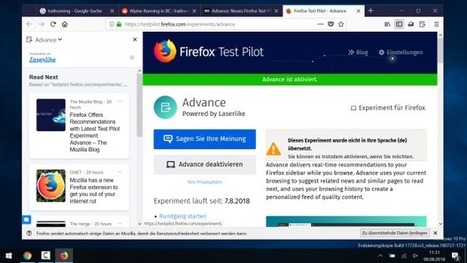





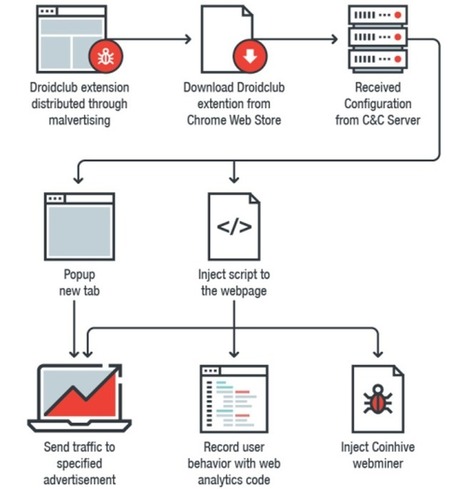
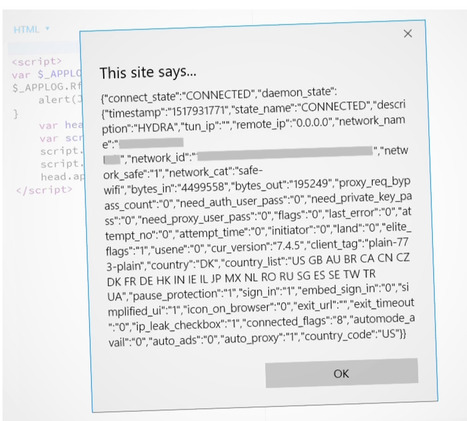











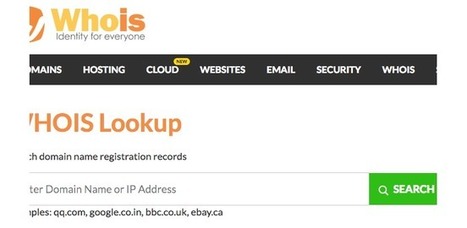
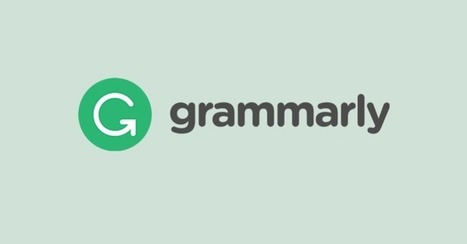
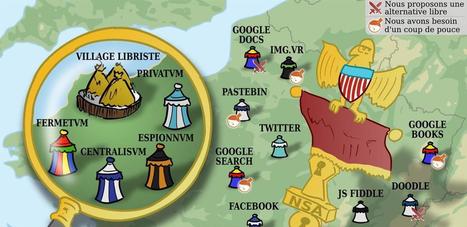









Das Tracking wird über die US-Firma Laserlike abgewickelt. Damit die Empfehlungen in der Seitenleiste auch passen, ist der umfangreiche Zugriff auf Daten, etwa den Browser-Verlauf und die aktuell geöffneten Seiten, nötig. Außerdem sammelt Laserlike IP-Adresse, Zugriffszeiten und Verweildauer auf Webseiten.
Im Rahmen von Test-Pilot tracken Laserlike und Mozilla noch Daten zur Nutzung von Advance, etwa Verweildauer auf empfohlenen Seiten oder Informationen zum Betriebssystem. Was man Mozilla zugute halten muss: Sie verschweigen das Thema Tracking nicht und bauen einen Schalter ein, um Advance pausieren zu lassen.
Auch im Privatmodus oder mit eingeschaltetem Tracking-Schutz funktioniert die Erweiterung nicht. Wer möchte, kann die übermittelten Daten einsehen und löschen.
Learn more / En savoir plus / Mehr erfahren:
https://www.scoop.it/t/securite-pc-et-internet/?&tag=tracking